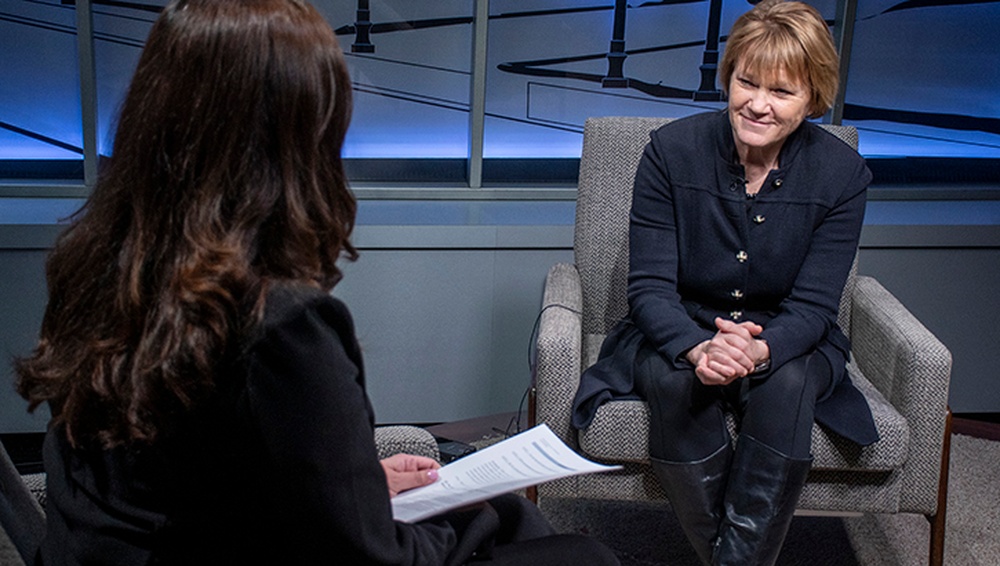After nearly 30 years of dedicated service to the Military Health System, Acting Assistant Secretary of Defense for Health Affairs Seileen Mullen departs the MHS Jan. 17, 2025.
In her last interview in this role, Mullen said that her time in the MHS “has been a terrific journey. It has been a pleasure and an honor to serve our service members and their families.”
Since March 2022, she has advised the Secretary of Defense and the Undersecretary of Defense for Personnel and Readiness on all Department of Defense health and force health protection policies, programs, and activities.
This is the second time she held the position of acting assistant secretary of defense, the first from March 2022 to February 2023. She stepped back into this role in October 2024 when Dr. Lester Martinez-López, the former Assistant Secretary, retired.
Career in Military Health
Mullen started her career as a professional staff member for the House Armed Services Committee from 1990-1993. She joined the Department of Defense in 1993 as a special assistant and executive officer to the Assistant Secretary of Defense for Health Affairs, where she provided advice and counsel on health care and operational policy matters. In this role, she also contributed to the publication of the Final Report of the White House Task Force on Persian Gulf War.
From 1996 to 1998, she was the director of the Department of Defense’s TRICARE Management Activity’s Aurora (Colorado) Field Office where she managed TRICARE contracting activities, to include the first-ever generation of TRICARE managed care support contracts.
She later spent time in the private sector as a health care policy consultant before returning to the MHS in 2022.
“I started in one of the lowest positions you can be, which is a special assistant,” Mullen said. “And here I am, the acting assistant secretary. So … I tell everybody—you can be me when you grow up.”
Evolution of the MHS
Throughout her career, Mullen has seen the MHS evolve and mature, including the establishment of the Defense Health Agency in 2013.
“The MHS has changed, but our mission hasn’t,” Mullen stressed. “That’s to take care of our active duty, family members, beneficiaries, and retirees—9.5 million people all over the world. The mission hasn’t changed; how we’ve delivered care has.”
Establishing the DHA in 2013 was a monumental undertaking by the DOD, and again from 2019 to 2022 when all military hospitals and clinics formerly operated by the U.S. Army, U.S. Navy and U.S. Air Force were reorganized into the Defense Health Agency with one overarching purpose: to standardize and improve clinical practices, which improves the quality and outcome of that care; and to standardize practices to improve the experience of getting that care to patients.
“Now, we have standardization across the entire force, which has also been a cost and efficiency savings for the department,” Mullen said.
Another significant achievement has been the creation of a single electronic health record system for the DOD, MHS GENESIS.
“The deployment of a single EHR in our system is a milestone,” said Mullen. “From the minute you get into the military to the minute you exit—you’re on the same electronic health record.”
MHS GENESIS gives service members, families, military retirees, and eligible veterans a single health record that follows them wherever they go, connects with civilian health information exchange networks, and uses the latest technology to enhance care, standardize practices, improve safety, and support readiness. Phased deployment began in September 2019. By March 2024, the system was fully deployed worldwide. It is now used by more than 200,000 medical personnel, and it is accessible by more than 9 million beneficiaries, making it one of the largest electronic health record systems in the world.
Mullen’s previous experience managing TRICARE contracting activities gave her the insight to oversee the TRICARE Health Plan put in place its current two regional contracts under the $165 billion fifth-generation contracts that began service Jan. 1, 2025.
“When I was last on board, I oversaw the delivery of the very first TRICARE contract,” Mullen said. “Now with this fifth generation, I got to be in the position of overseeing a consolidated contract to further help beneficiaries with their care.”
She also worked with Martinez to finalize and implement the MHS Strategy, laying down the groundwork for system stabilization, increased medical readiness, and the use of artificial intelligence and digital tools.
She said the MHS Strategy focuses on readiness and health care for all beneficiaries.
“The strategy is built around taking care of our people with education and training for the right skills to deploy ready, reliable care, and stabilizing the MHS with increased capacity and improved experience of care,” said Mullen.
Supporting Women in the Military
With women accounting for almost 20 percent of active duty military force, improving their access to appropriate health care became an important focal point of Mullen’s time in the Pentagon.
“When I first came on board, we looked at the fact that women are the fastest growing population in the military … we asked, ‘what were we doing for them, and what do we need to do for them?’” she said.
“We looked more at what we needed to focus on, whether it was reproductive health, how they carry a pack differently, or the effects on the body if they want to conceive or going through menopause.”
During her tenure, the MHS expanded walk-in contraceptive care services worldwide to improve reproductive health services. These services include same-day access with no appointment or referral needed.
Mullen also saw the launch of the Military Women’s Health Research Initiative, a collaboration between the DOD, Veterans Health Administration, and key leaders in military health. Under that effort, $500 million has been allocated to fund ongoing research and other commitments to advance women’s health research.
“I’m really proud to say how much we’ve been part of the initiative,” Mullen said. “That’s a huge and great investment for women’s health … it’s for those who serve.”
Digital Future for the MHS
At the end of 2024, MHS leaders developed the first Digital Transformation Strategy to enable the overarching MHS strategy, focusing on the role of digital health in advancing a medically ready force, the ready medical force, improving patient care, clinical efficiency, and health outcomes.
The strategy outlines a comprehensive plan to integrate digital health and artificial intelligence technologies into military medicine, focusing on improving patient outcomes, operational readiness, and system efficiencies.
“Like many institutions, we have begun work building a foundation, the adoption, and use of trustworthy AI in military medicine,” said Mullen. “We need to take our time to do this right for budget, safety, and ethical concerns.”
Mullen emphasized, “AI is the future of health care, and we need to keep up with that.”
Lessons Learned in Leadership
Mullen said that one of the biggest lessons that she learned in her time in the MHS is to “trust your people.”
“They’re smart; they know what they’re doing,” she said. “If you trust people and you ask them to do hard things, they will show up for you … your job is to let people do their job and provide them top cover.”
Having trusted mentors around her that she could reach out to “helped shape the kind of leader I became.”
“One of them became the secretary of the Air Force, and another became secretary of the Army. We talk all the time, and they’re constantly telling me how to do my job,” she jokingly said, adding, “They’ve been wonderful mentors.”
As she winds down her career in the MHS, she encouraged beneficiaries and providers to remember “not to give up on us.”
“We are trying to stabilize the system. We are trying to get our military providers in there to treat you,” Mullen said. “We are trying to get more civilians to help deliver that care. We are doing our best, and I think we’re going to get even better at this. And we really want you to hang in there with us.”
She also encouraged civilians and younger people studying medicine to consider joining the MHS for their profession. “Come in and be a part of the MHS. It’s a great career to get into.”
“Almost every single big health care discovery in America has come from the MHS,” she added.
Not Done Working Yet
Though not retiring, Mullen plans on taking some time off to think about her future.
She thinks it is important not to just stay in the government but to also venture out into the private sector to view things from their perspective.
“I’ll probably do some work in the private sector, and, who knows, I may be back here again. You never know.”
Mullen said she considers herself incredibly fortunate.
“This has been the pinnacle of my government career. I can’t imagine coming to a better job and a better group of people.”
| Date Taken: | 01.15.2025 |
| Date Posted: | 01.15.2025 14:00 |
| Story ID: | 489130 |
| Location: | US |
| Web Views: | 10 |
| Downloads: | 0 |
PUBLIC DOMAIN

This work, ‘Pinnacle of Career’ Says Departing Military Health System Leader, by Robert Hammer, identified by DVIDS, must comply with the restrictions shown on https://www.dvidshub.net/about/copyright.





